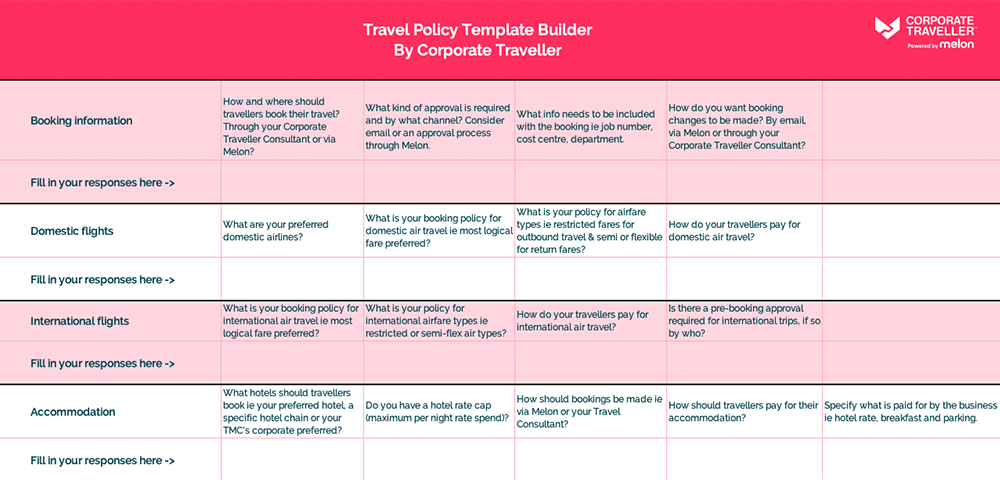
Guide to corporate travel safety and risk management
Every company with a travel program needs to factor in duty of care. It's your job to make sure employees feel safe and secure while travelling, and to prepare for any pitfalls.
A travel policy not only protects your company, but it also protects your travellers, and offers peace of mind for everyone involved. And, it can serve as a point of reference if you run into an issue and aren’t sure how to act.
Contents
- Risk management vs duty of care
- Putting safety into your policy
- What is duty of care?
- Inclusivity and accessibility
- Corporate travel security
- How to conduct a risk assessment
- Writing a duty of care travel policy
- Implementing risk management
- How Melon can help
- Benchmark your travel policy
- The bottom line
Travel risk management vs duty of care
What would you do?
When a sudden accident cut off the Blast! Films crew in a remote part of Siberia, the Corporate Traveller Stage, Screen and Sports team organized transport home and quickly found a way to book an alternative filming location.
That's an example of an extreme situation where people were cut off from basic supplies. So how would you handle that kind of unexpected risk situation?
Risk management is essentially the overall strategy that minimizes risk to the company and travellers. It’s an umbrella term or a broader strategy to limit expected and unexpected risks. An expected risk might be something like delays at customs if travellers don't have the right travel documents.
A risk management program should have guidelines on selecting travel services to reduce risk in a specific country. Another part of the program might describe the plan to deal with potential risks and who to contact for emergency travel support.
Duty of care, though, is more specific. Meaning the company's legal responsibility to ensure employee safety and security while travelling for business. Business trips shouldn’t be an environment where employees face hardship or are distracted.
How to build business travel safety and risk management into your company policy
How do you start building business travel safety and security into a travel policy? A good travel policy should let employees know what to expect when travelling, how to stay safe, and what to do in an emergency.
Most policies give some guidance and steps for basic things like booking, different forms of travel, accommodation, and safety and security. It all comes back to being able to focus on the purpose of your business travel. Our travel managers help navigate the complexities of travel, whether that be helping with information or finding the best travel options, so your team can focus on doing their best work.
What is duty of care?
It’s simple, really. Business travel duty of care means the responsibility of bringing business travellers home safely. This legal concept means assessing and preparing for risks that could affect employee health, safety and security.
What is a company's role in duty of care?
Duty of care is a core responsibility for a company that has a travel program. The purpose of corporate travel is business, so travellers rely on their company to support them when they’re away from home. Often, the company is making the call on how to choose travel plans, not the employee, and they’re responsible for ensuring a good outcome.
What risks should be considered?
There are so many different risk categories that should be considered for business travel, but some of the main ones include:
- Travel closures or disruptions
- Health risks
- Natural disasters
- Political unrest
- Local crime levels
That’s by no means an exhaustive list, but thinking about corporate travel safety means assessing the expected and unexpected travel risks that employees might face.
How can travel be inclusive and accessible?
For any workforce, it's important to consider how diversity and individual needs apply to risk management. Travel policies can be an opportunity for inclusion and to reinforce overall work culture values.
It’s all about your perspective. Travel policies need to consider corporate values but also the individual needs and preferences of travellers. Listen to what employees have to say about your travel program, especially team members who take frequent business trips. Work with HR to find out about existing DEI employee feedback and relate that to your travel management company.
Safety. It’s critical for business travel. You can use a risk assessment exercise to create a travel policy that supports your diverse group of business travellers. Your travel policy should emphasise services and accommodations that are inclusive, to avoid the concerns below.
- LGBTQIA+ Travellers: Educate travellers about local laws so they can make safe choices about travel. There are about 70 countries with laws against same-sex relationships.
- Women Travellers: Harassment is a common issue for women travelling alone. Provide information about which local emergency services and transportation options or services (taxi, public transportation) are recommended as safer methods.
- Disabled Travellers: Pre-authorisation for reasonable changes to travel policy can help disabled travellers handle travel and work responsibilities without worry. Another good idea is to assess medical risks and medical support unique to the traveller and country.
- Racial Profiling of Travellers: People of colour and religious minorities may experience negative interactions and stereotypes while travelling. Use your travel policy to communicate to employees that the company understands these risks and provides support with resources.
Corporate travel security
What’s the difference between safety and security? While business travel safety of employees is the most important risk to protect against, travel security is another piece of risk management. This includes making sure travellers understand how to keep their belongings and company items secure as well as other security measures.
Include some best practices in your travel policy for choosing accommodation, ground transportation and who to contact. Before departure, deliver information for travellers that lists all the essential requirements, like travel documents, and any risks to be aware of in their destination.
How to conduct a risk assessment
There are six areas to review for risk assessment. How would you rate your knowledge and preparation in these areas? If this sound new to you, chat with your travel manager and they can help you plot out your risk management strategy.
1. Preparation and flexibility
Help employees start off on the right foot. Employee onboarding is a perfect time to look at the travel policy. An updated policy that’s clear and easily understood by all stakeholders is essential. So, do employees know what type of travel is allowed and how to book a business trip or get approvals? Are there clear guidelines on what to do in an emergency?
If you frequently travel to certain countries, a pre-travel guide for travellers with information on corporate travel safety tips, public transportation, business customs and dress codes, is a must.
Travelling can be tiring and long connection times or different time zones can lead to poor sleep and jet lag. Keep employee health and wellness top of mind by offering information on how to stay healthy while travelling.
2. Business travel insurance that’s the right fit
With so many travel risks to consider, comprehensive coverage not only protects your travellers, but it also protects your business from unforeseen costs. From natural disasters to health issues, corporate travel can get complicated.
Insurance companies provide financial and logistical support when things go wrong, and you need it the most. Make sure you know what's covered and what isn't by reaching out to your insurance provider or dedicated travel manager.
3. Technology in your toolkit
There’s an app for that! Travel management technology can provide a handful of advantages, like customisation, 24-hour assistance and real-time updates. The Melon app is our tool for integrated travel support, and it's a great way to ensure the safety of your road warriors.
The app offers weather updates, flight time changes and instant access to a real human travel expert. With Melon mobile travellers can search, book, and change their travel plans on the go.
And if they're in a jam, they can chat with a travel expert in one click, receive real-time notifications of any business trip disruptions, and stay up-to-date with the latest traveller safety requirements.
4. Expert advice
Travel managers are professionals who understand the nuances of corporate travel safety and risk management. Enlisting their help can keep you aware of corporate travel security risks.
We offer 24/7 emergency support from expert travel managers who know your business and policies. No matter when you call or chat, you'll be in touch with a real person who knows how to help.
5. Simplify and verify
One and done. Travel management can get complicated quick, especially if you’re using different systems or service providers.
Consolidating travel under one channel can be a huge advantage. You can save time, save costs and gain more visibility with the proper processes in place. When adding new providers, it's also a good idea to have ways to vet and evaluate them so you can minimise future travel risks.
6. Seek feedback
You don’t know until you ask. Employees travel for a lot of reasons, and experience and expectations will differ. Don't assume they can learn on the go, and check that business travellers know how to stay safe in the locations and situations they’ll be in.
What about ongoing feedback? Gathering employee input on the hotel experience, length of travel time, and other factors can help identify travel pain points. We offer special rates and perks that make business travel more comfortable. Just ask!
Writing a duty of care travel policy
A duty of care travel policy should work alongside the health and safety policy and be part of the overall travel policy. It's a plan that lays out how the company will uphold its responsibility to keep travellers safe and secure on a business trip.
Grab our travel policy template to help you get started and see how your policy measures up:

Grab our corporate travel policy template builder
Not sure where to start? No worries! We’ve got you. Here’s how to streamline your process with a travel policy template!
While there’s no one-size-fits-all travel policy for every company, following the set guidelines helps you nail a perfect-for-you policy that can see you through an ever-changing travel climate.
How to implement a risk management program
At the heart of your travel policy is your people, a core risk management principle. Listening to, communicating with, and training sessions are all part of the process. Building a solid risk management policy is the best way to be proactive and keep everyone safe.
1. Understand traveller needs for their business trip
Traveller needs can have a variety of meanings, depending on the situation. It can be individual preferences, part of a DEI policy, or working to provide information on food and water safety, or necessities during a crisis.
With our years of experience in serving travellers, we're proud of the service and support that we offer our clients.
ZVRS is a client that provides video communication services to people with hearing disabilities. Staying in communication with travelling employees was a big challenge for the company, but by using Melon, they were able to implement some simple and effective travel solutions.
2. Communicate resources
Describe, explain, and summarise again. Have a crystal-clear communication plan to share with all employees and decision-makers. Use the same channels to explain any new updates to your travel policy, too. This messaging should go over how approvals work, expectations of employee behaviour, FAQs, and opportunities for employee feedback.
Communication is the first step in gaining employee's trust and build compliance with new policies. Once it has been discussed, the next essential step is training.
3. Train travelling employees
Technology and tools can be intuitive if you use them regularly, but that might not be the case for all of your travellers. We’ve worked with thousands of business travellers, and our platform is easy to use and simple to explain to new employees.
It’s also a good idea to include a one-page how-to training guide for people who are new to your travel program.
4. Tools to help with business travel duty of care
So, what are some ways that you can provide a strong duty of care for travellers? Well, we've got options! Working with us gives you access to dashboards, intuitive tools and templates to help you along the way.
Melon: Everything you need to travel at your fingertips
By now, you've heard a bit about the Melon and what it can do, but did you know there’s a Melon app? The Melon mobile app is the on-the-go platform for everything travel-related, like accessing itineraries, receiving real-time travel alerts and live-chat assistance. There are multiple benefits to using the app for travelling employees and for the business.
Profile management helps travellers keep all their important details in one place. On-trip support is one click away if anything unexpected happens, with phone and email support available 24/7. Melon's intuitive Traveller Safety dashboard provides real-time travel security alerts and country risk ratings, helping you keep up with the latest news.
For travel bookers, metrics like traveller tracking and trip disruptions in the admin dashboard help you maintain duty of care and support your travellers. Travel and safety information can be localised with local language settings for companies with a diverse workforce.
Book a meeting to see how Melon can improve travel management for your business.
Try it now: Benchmark your travel policy!
When reviewing your travel policy from the lens of risk management, where should you start? See how your travel policy stacks up with our benchmarking tool. In less than 3 minutes, you can check your current policy against a quick guide to best practices.
Looking at areas like compliance, approvals, reporting and spending policies can help identify areas needing an update or review. One quick tip is to look at travel and health and safety policies together to make sure they’re working towards the same goals.
The bottom line for managing safety & risk
Planning and prep are key to implementing a travel risk management program. Our resources and experience to guide you through the tricky areas of travel safety.
Want to create a comprehensive plan to manage business traveller safety, risk, and protect your best business assets? Let's chat about a better corporate travel safety plan for you today!

It's time for better business travel management
With the perfect balance of modern travel technology and dedicated experts, you really can have the best of both worlds.
- Dedicated travel consultant
- Intuitive all-in-one travel platform
- Search, book, and report in minutes
- 24/7 emergency support & live-chat
- Traveller tracking & duty of care dashboard
- Melon Exclusive Deals, negotiated rates, and more!